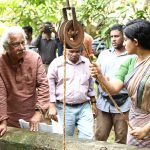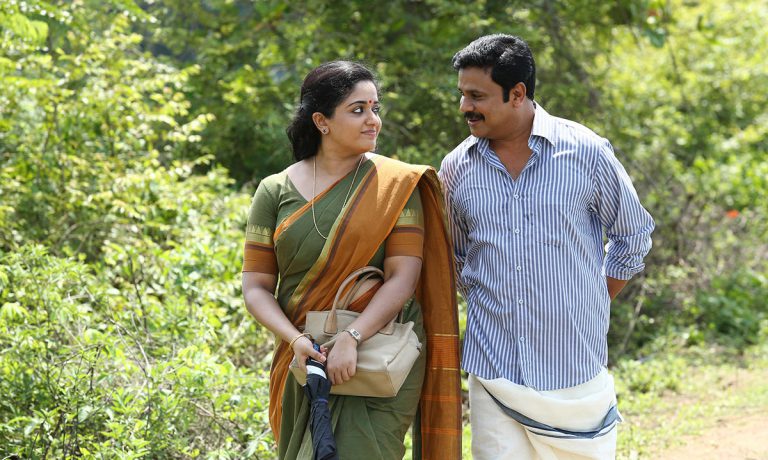Festivals:
Toronto International film festival 2016 (Masters’ section), Los Angeles, London, Mumbai, Kolkata, New Delhi, Trivandrum (IFFK), Melbourne, Singapore
Synopsis in brief
The father is an upright, retired schoolteacher and head of a lower middle-class family, his schoolteacher daughter has a jobless husband who is passionately in love with her, his brother-in-law who is an ex-army officer – all willy-nilly get drawn into the vortex of a crime, not realising how it will overturn their lives forever.
Synopsis
 After a long and dedicated courtship the unemployed Purushan marries a young, charming girl, Devi. They have a six year old daughter and pressures rise as the household is run entirely on Devi’s schoolteacher salary. Purushan’s status at home and the family circles is not very enviable. He senses that even his wife is somewhat uneasy with him. Eventually a job offer in Dubai comes Purushan’s way; both the job profile and pay are beyond what he could have expected. The distance and the separation rekindle the love between the couple. His esteem before his wife is regained and his status within the family and the village rises. Having tasted the fruits of wealth Purushan thirsts for more. His greed triumphs over sanity and reasoning. In a bid to claim the lofty insurance sum, colluding with his ensnared father-in-law and Devi’s uncle, Purushan devises a plan to fake his own death. In a dark turn of events, unable to find a corpse, they murder a man and burn Purushan’s car with the body inside. The conspirators get caught, while Purushan goes into indefinite exile facing a murder charge on his return, if ever. Many years later, late at night, Purushan appears like a phantom at the window of Devi’s bedroom. He has put on weight, altered his looks through plastic surgery, and is quite unrecognizable.
After a long and dedicated courtship the unemployed Purushan marries a young, charming girl, Devi. They have a six year old daughter and pressures rise as the household is run entirely on Devi’s schoolteacher salary. Purushan’s status at home and the family circles is not very enviable. He senses that even his wife is somewhat uneasy with him. Eventually a job offer in Dubai comes Purushan’s way; both the job profile and pay are beyond what he could have expected. The distance and the separation rekindle the love between the couple. His esteem before his wife is regained and his status within the family and the village rises. Having tasted the fruits of wealth Purushan thirsts for more. His greed triumphs over sanity and reasoning. In a bid to claim the lofty insurance sum, colluding with his ensnared father-in-law and Devi’s uncle, Purushan devises a plan to fake his own death. In a dark turn of events, unable to find a corpse, they murder a man and burn Purushan’s car with the body inside. The conspirators get caught, while Purushan goes into indefinite exile facing a murder charge on his return, if ever. Many years later, late at night, Purushan appears like a phantom at the window of Devi’s bedroom. He has put on weight, altered his looks through plastic surgery, and is quite unrecognizable.
Synopsis in detail
 After a long and dedicated courtship, Purushan gets to marry Devi, a young woman of great charm and beauty. Her father Pappu Pillai, a widower and a respectable retired schoolteacher, had no option but to yield to her wishes even though her suitor was unemployed.
After a long and dedicated courtship, Purushan gets to marry Devi, a young woman of great charm and beauty. Her father Pappu Pillai, a widower and a respectable retired schoolteacher, had no option but to yield to her wishes even though her suitor was unemployed.
The couple now have a daughter, Revathi, aged six. However Purushan, a graduate in commerce, is still seeking a job. It is Devi’s teaching job in a school that keeps the family going. Purushan is not-so-subtly reminded of this awkward situation by both his father-in-law and Devi’s uncle, a jovial ex-military officer. Devi’s elder brother Kuttan, a weakling, understands Purushan’s plight and sympathises with him. Meanwhile, Purushan pins his hopes on his friends who have made it good in the Middle East and waits endlessly for their call.
One day, the job offer and the visa to travel to Dubai arrive and things seem to be looking up. Even the harassed and irritable Devi softens her attitude to her husband. He is seen off with mixed feelings of sadness and hope. As for Purushan, the job he is posted in and the salary he draws are beyond all expectations.
In separation, the couple discover their real love for each other. He writes home to Devi about his dreams of their living a life free of worries and cares. He has plans to look after not only his own family but also his sister’s which is on the verge of collapse due to her husband’s reckless ways. He insures his life for a huge sum and sets aside most of his salary to pay the premiums. On one of his visits home, he buys a second hand car much to the disapproval of all his relatives and friends who think the vehicle does not befit the status of a Gulf-employed officer.
 Purushan tries hard to convince Devi that they would stand to gain a huge amount of money as compensation from the insurance company by faking his death. He has it all planned to minute detail – a scared Devi advises him to be content with what they have.
Purushan tries hard to convince Devi that they would stand to gain a huge amount of money as compensation from the insurance company by faking his death. He has it all planned to minute detail – a scared Devi advises him to be content with what they have.
But he cannot be persuaded to abandon his grand scheme. Needing accomplices who can be trusted, he ensnares his father-in-law and the sympathetic uncle in his plot. However, their search for an unclaimed dead body in likely places turns out to be frustrating – finally deciding that even a sickly or dying beggar on the street would do. No chance. Beggars smell danger and cry out for help when accosted by strangers in the night. When the search for a prey becomes desperate, Pappu Pillai is inclined to opt out. But his resolute brother-in-law rebukes him and brings him around.
It then happens that they chance upon a solitary figure on a deserted road requesting a lift. His wife is in labour and he needs a ride to the taxi stand on the highway. The lift is readily offered and the passenger takes the front seat, thanking them profusely for their kindness. It has been a good day for him, he too has got his visa and posting in Gulf after a long wait and is excited about the prospects.
But as the vehicle speeds along, a rope is suddenly thrown and tightened around the passenger’s neck. He shouts in disbelief: ‘Why are you killing me?!
 No one answers. It does not take long to silence him. The car pulls to a halt on the isolated road; they push the dead body to the driver’s seat and have its hands rest on the steering wheel. They cover the vehicle with hay-stalk, pour petrol all over it, and sets it on fire. As it is engulfed in flames, the three escape into the darkness.
No one answers. It does not take long to silence him. The car pulls to a halt on the isolated road; they push the dead body to the driver’s seat and have its hands rest on the steering wheel. They cover the vehicle with hay-stalk, pour petrol all over it, and sets it on fire. As it is engulfed in flames, the three escape into the darkness.
A large sympathetic crowd has gathered at Devi’s house. Her father laments his daughter’s ill fate. Everyone sympathises with the family – till reports begin to appear in the press that the person killed in the accident was not Purushan. But no one, including Devi, knows where her husband has vanished.
The police start investigating the case. When the identity of the corpse in the car becomes known, the case gets complicated: Why should anyone kill a stranger? And for what? Tortured in police custody, Kuttan is crippled. Pappu Pillai and brother- in-law Kittu Pillai, the second and third accused, confess to the crime under duress.
Years pass as court proceedings are prolonged. Finally, the first accused Purushan is declared a permanent absconder who, when and if he surfaces, will be charged with murder. The other two are sentenced to life imprisonment.
In a couple of years, Kuttan Pillai dies in prison while Pappu Pillai refuses to go home on parole or meet anyone, including his daughter. As far as he is concerned, he is counting the days to his death.
Devi’s daughter Revathi is now a second-year college student.
Then, late one night, Purushan appears like a phantom at the window of Devi’s bedroom. He has put on weight, altered his looks with plastic surgery, and is quite unrecognisable…
Director’s Statement
 A murder case from Kerala’s recent past involved a Gulf- employed man who killed and burnt a stranger in a hideous plot to fake his own death so as to claim insurance. The man did not surface again after the plot boomeranged. If he ever returns, he will face capital punishment. But life in exile without love and relationships is not any better than death itself.
A murder case from Kerala’s recent past involved a Gulf- employed man who killed and burnt a stranger in a hideous plot to fake his own death so as to claim insurance. The man did not surface again after the plot boomeranged. If he ever returns, he will face capital punishment. But life in exile without love and relationships is not any better than death itself.
This predicament of a person who virtually exchanges his life for money set me thinking about our concepts of good life; happiness, identity, love, human relationships and values that guide us through life. We are living in a period when material wealth seems to be the measure of success. According to ancient Indian precepts, acquisition of any kind is the root cause of sorrow. When the means of acquisition is foul, it brings with it a spectrum of endless miseries.
 Pinneyum is centred round a family of middle-class means and values. Its members are as normal as your next door neighbours. Purushan, the unemployed son-in-law who is gradually turning into an object of contempt, finally manages to bag a job abroad and observes his status and fortunes rise accordingly. Having once tasted the benefits of wealth which had evaded him for long, he craves for more – even going to the extent of faking his accidental death.
Pinneyum is centred round a family of middle-class means and values. Its members are as normal as your next door neighbours. Purushan, the unemployed son-in-law who is gradually turning into an object of contempt, finally manages to bag a job abroad and observes his status and fortunes rise accordingly. Having once tasted the benefits of wealth which had evaded him for long, he craves for more – even going to the extent of faking his accidental death.
The whole family gets entangled in the web of deceit and cannot be extricated. The father who has thus far been a model of human uprightness cannot but fabricate a story as an alibi. Devi, the daughter who is a virtuous character, tells a convincing lie when the police questions her. The tragedy lies in their inability to contain a deep moral crisis.
Filmmakers and Critics Say
‘It’s been eight years since the last film from south Indian master Adoor Gopalakrishnan. The director of such acclaimed classics as Swayamvaram and Kathapurushan takes his time, and the effort shows in the layers of detail that reveal themselves in this story of love, sacrifice, and, most surprisingly, murder….
Despite the ugliness it reveals, the film remains light and graceful, its widescreen images composed with an eye both to visual harmony and to relaying the shifting power relationships among the characters. Similarly, the performances are calibrated to deliver impact without excess:(Kavya) Madhavan is especially strong here, working in a dramatic register that is decidedly different from the many romantic comedies in which she’s co-starred with Dileep. As Kerala’s rains descend and Devi is drawn into a much darker marriage than she could ever have imagined, Once Again becomes a scintillating contemporary noir’.
–Cameron Bailey, Toronto Film Festival
‘Glad to say, I enjoyed the film, which was brilliantly directed and acted with sympathy’
–Derek Malacolm, Critic U.K
‘As firmly rooted in the socio-cultural ethos of Kerala as all his films, Adoor Gopalakrishnan’s Pinneyum (Once Again) is a universal and forceful cautionary tale that drives home its point with striking formal precision and narrative depth.
This story of ill-fated love is deliberately paced and filled with an air of melancholy. It is at the same time shot through with touches of lyricism and flashes of illuminating insights on the human condition.
The superb performances from the principal cast members serve to heighten the impact of the drama. Especially notable is Indrans in the supporting role of the ‘weakling’ conscience keeper. Dileep and Kavya Madhavan, the film’s pivots, deliver restrained performances, while Nedumudi Venu is, as always, effortlessly effective.
Pinneyum is clearly the work of a maestro who has nothing to prove: undemonstrative but staggeringly impactful.
-Saibal Chatterjee, NDTV Digital
Adoor is one filmmaker who achieves a rare balance between the existential and the sociological. In Pinneyum, it is a seamless passage. Taken together, his twelve feature films, rooted in the feudal ruins of middle Kerala, is a visual history of man hopelessly imprisoned by his own fears, told by one of Indian cinema’s last living greats. In his telling, frames carved from memory and everydayness, the emotional and the intellectual, the spiritual and the ideological, the natural and the fantastical, merge so effortlessly. It has been one the longest journeys in the Indian New Wave, without a false step. The fierceness of that commitment, and the pause-less patience, has made him a lone reaper. The unadorned realism of Pinneyum isillumined by an intimate memory, but Adoor does not close the window on it. Once Again.
S. Prasannarajan, Editor, OPEN Magazine
Outsized ambition transforms a modest family into virtual outcasts in Once Again, a cautionary tale framed as an unusually understated crime drama. After debuting last year at Toronto and playing the recent Indian film festival of Los Angeles, Adoor Gopalakrishnan’s latest feature could go to draw further attention in niche markets or via digital formats.
Struggling Purushothaman (Dileep) is well known around his small south Indian city not only for his chronic unemployment, but also as the target of frequent jokes and snide comments, mainly because his wife Devi (Kavya Madhavan) singlehandedly supports their household of five. Despite a university accounting degree, he fumbles one interview after another, coming home dejected to Devi, whose patience is wearing thin, as this situation has been ongoing since their marriage eight years previous and their meagre income is stretched to the limit.
Relief arrives in the form of an employment visa to work for a major company in Dubai, so Purushothaman departs with promise of imminent support. He dutifully sends home his earnings after starting the job, and Devi and the family are soon enjoying much improved circumstances.
Then newfound prosperity isn’t lost on numerous relatives and townsfolk, who eagerly drop by their house seeking handouts of one kind or another.
Once Purushothaman returns home on leave, he’s positively inundated with requests, bus his min is on other things. Taking clues from his favourite Sherlock Holmes novels, he he’s hatched a scheme that will make him the richest man in town if he can pull off what’s shaping up as an audacious caper. Recruiting his uncle and retired-school teacher father-in-law with promises of unexpected wealth, Purushothaman puts his plan into action, but like so many poorly conceived crimes, things quickly go awry. Whether he can get the plan back on track before it completely unravels and exposes him will determine not only his own future, but the fate of his family as well.
Malayalam cinema vet Gopalakrishnan makes a stealth approach in Once Again, opening with a feint toward a domestic melodrama and then craftily overlaying a nourish narrative in the latter half of the film.
Low-key leading man Dileep makes a better householder than a scheming fraudster, but also displays a bumbling charm that lends his early scenes a bit of understated humour. As his long-suffering wife, Madhavan doesn’t really get a chance to shine until the latter half of the film, once she’s assumed her place as de-facto head of the family.
–Justin Lowe, The Hollywood Reporter
Credits:
- Story, Script, Dialogue & Direction: Adoor Gopalakrishnan
- Production Company:Adoor Soma Combine
- Combine Producers: Baby Mathew Somaatheeram & Adoor Gopala- krishnan
- Image M.J. Radhakrishnan
- Music Bijibal
- Sound mixing: N. Harikumar
- Editing B. Ajithkumar
- Decor Marthandam Rajasekharan
- Chief Assistant Meera
- Make-up: Roshan.G
- Costumes SB Satheesan
- Stills Mohan(Momi)
- Production Controller Kettidathil Vijayan
- Production Design Cuckoo Parameswaran
- Duration 121 Minutes
- Color Format Cinemascope
- Sound Dolby 5.1
- Language Malayalam
- Country India
- Year of Production August 2016
Cast & Characters
- Dileep (Purushothaman Nair)
- Subodh Bhave (Purushothaman Nair- second part)
- Kavya Madhavan (Devi, Purushothaman Nair’s wife)
- Nedumudi Venu (Pappu Pillai Devi’s father)
- Vijayaraghavan (Kittu Pillai – Devi’s uncle)
- Sathi Premji (Kittu Pillai’s wife) Baby Akshara (Child Revathi – Devi’s daughter)
- Meera Nallur (Revathi –Senior)
- Indrans (Devi’s elder brother)
- Srinda (Purushothaman Nair’s sister)
- Nandu (Sister’s husband)
- Lalita (Rtd.School teacher)
- Ravi Valalathol (Head constable)
- John Samuel, Sudhir Karamana (Police Inspectors)
- Prof. Aliyar (Lodge manager)
- M.K.Gopalakrishnan,Punnapra Appachan (Paper readers at the tea-shop)
- M.V.Gopakumar (Tea shop-owner)
- Dr. M.K.P. Nair (A distant relative)
- Krishnan Balakrishnan (Lift seeker)
- Visakh (Lift seeker’s son)
- G.Balachandran (Dy.SP)
- A.M Rashid (Circle inspector)
- Alex Vallikunnam (Postman)
- Jayaraj (Begggar)
- K.P.S.Kurup, Sasi Kuwait, Raghu Natakayogam (Tea shop customers)
- P.Sreekumar, P.C.Soman, Dileep Dev, Sudarsan, Thirumala Ramachandran, Pakalkkuri Rajendran (Temple festival committee)
- Valsala Sevana (Neighbour)
- Harish (Lodger)
- Padmnabha Panikkar (Head Constable)
- Naushad Naduvath (Police Constable)
- Krishnaprasad (Photographer)
- Laiju Sagara (Pick-up driver)
- Arun sagara (Pick-up cleaner)
Guest Appearance:
- C.P.Nair
- Parvathi
- M.G. Radhakrishnan
- Gouridasan Nair
Enquiries
| Adoor Gopalakrishnan Darsanam Trivandrum 695017 Kerala India Phone: +91-471-2446567,2551144 cell: +91-9446046567 e-mail adoorg@gmail.com |
Baby Mathew Soma Creations Chovvara P.O Balaramapuram Trivandrum – 695 501 Kerala India Phone:+91-471-2268101Cell:9895636363 e-mail: mail@somacreations.org |
More Stills:
 |
 |
 |
 |
 |
 |
 |
 |
 |
 |
 |
 |
 |
Working Stills:
 |
 |
 |
 |
 |
 |
 |
 |
 |
 |
 |

